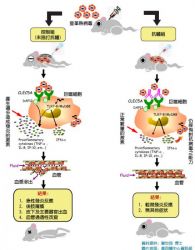On May 21th (US.PDT), the Nature Advance Online Publication Website has reported a research result regarding Dengue Fever. The work is done by a group of Taiwanese scientists from Yang-Ming University as well as Academia Sinica, including Dr. Shie-Liang Hsieh, Dr. Yi-Ling Lin and Dr. Chi-Huey Wong.
Dengue is mosquito borne and infects at least 50 million people a year and threatens two fifths of the overall population on earth. However, little was known about how the virus causes disease, not to say how to cure the infected. .
|
By applying an innovative mechanism that can identify viral receptors effectively, this team has identified a molecule targeted by dengue virus in mice to bring about the haemorrhagic fever associated with lethal disease. The research could help the development of therapeutic agents for this and other viral diseases.
Hsieh and colleagues show that it hijacks the CLEC5A molecule on immune cells to cause a massive release of potent inflammatory agents known as cytokines.These cytokines are probably responsible for the inappropriate inflammation that causes haemorrhagic fever. Using antibodies to block the interaction between CLEC5A and dengue virus, the team found that they could prevent inflammation without affecting the normal immune response to virus infection. What’s more, 50% of mice treated with these antibodies managed to clear the virus.
This ability to control inflammation and simultaneously maintain natural viral immunity makes CLEC5A an exciting prospect for the development of treatment agents, claimed Hsieh.
This research is mainly sponsored by National Science Council.


